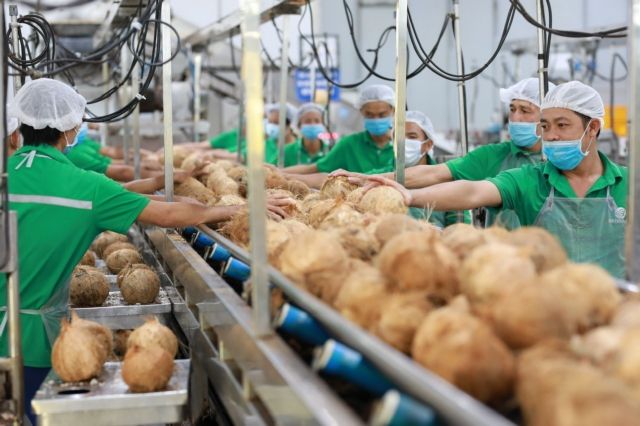 Economy
Economy


|
| Bùi Cẩm Hà, Managing Director and Head of Edelman Global Advisory Việt Nam. — VNS Photo Hải Anh |
HÀ NỘI — Over the last three years, exports to the United Kingdom have maintained a steady growth trajectory, even in the context of sluggish global economic growth and reduced consumer demand in key export markets.
This success reflects the combined efforts of businesses and regulatory authorities while showcasing the benefits of the UK-Việt Nam Free Trade Agreement (UKVFTA), officially implemented in May 2021.
Việt Nam News correspondent Hải Anh interviewed Bùi Cẩm Hà, Managing Director and Head of Edelman Global Advisory Việt Nam, to delve into strategies for leveraging the UKVFTA to expand Vietnamese agriculture, food and beverage businesses' footprint in the UK market.

|
| Production of canned coconut water at the Bến Tre Import-Export Joint Stock Company (Betrimex) in the Mekong Delta province of Bến Tre. — VNA/VNS Photo |
How does Việt Nam’s competitive position in the international market compare with other countries in the region, particularly in the agriculture, food and beverage sectors?
Việt Nam holds notable advantages in exporting agricultural, food and beverage products, thanks to unique quality, taste and flavour. The key strategic advantage lies in its extensive network of trade agreements. Việt Nam has signed numerous free trade agreements (FTAs) with major global markets, opening access to high-demand consumer bases with strong purchasing power.
Thus, the most competitive advantage over other competitors is a foundation of trade relations supported by bilateral and multilateral agreements that Việt Nam has joined.
In particular, Việt Nam and Singapore are currently the only two ASEAN countries that have signed the FTAs with the UK. While other ASEAN countries are still in the negotiation phase, Việt Nam has already entered the implementation stage of trade agreements. This gives us a temporary advantage in terms of its position in executing these agreements.
Vietnamese businesses must seize this opportunity to capture a significant market share and establish strong brand recognition. By the time other ASEAN nations move into their implementation phases, Việt Nam’s products will have already secured a stable and competitive position in the market.
In your opinion, what are the major challenges Vietnamese businesses face when exporting products to the UK?
The UK enforces stringent regulations on nutrition, public health, food safety, labour welfare and environmental protection, especially in the agricultural sector. Vietnamese businesses must thoroughly understand these local requirements to comply effectively.
Recent geopolitical and economic shifts post-Brexit have prompted the UK to explore new trade relations and channels. Therefore, while the UK's stringent standards persist, its drive to enhance two-way trade presents an invaluable opportunity for Việt Nam.
Another challenge for Vietnamese businesses exporting abroad is finding suitable partners to deeply and precisely target appropriate customer segments and distribution channels for their products.
As the Vietnamese saying goes: 'You need friends when trading’. Vietnamese businesses must invest in building partnerships and alliances, seeking out suitable partners to mutually support their market penetration efforts.
Although FTAs provide leverage in terms of tax reductions and technical barriers, pricing and distribution remain decisive factors. Identifying reliable distributors and partners who can effectively deliver products to target consumers is pivotal for maintaining competitiveness.
What strategies should Việt Nam adopt to enhance the competitiveness of its export brands in the UK market?
Export achievements are often measured in statistics, but the true strength of a product also lies in its brand.
Establishing a unified perception of Vietnamese products among international consumers requires time and a shift in consumer habits. However, with systematic and strategic investment, branding can undoubtedly become a powerful lever to help Vietnamese products penetrate deeper and become more familiar to consumers.
For example, domestic consumers know which regions are famous for premium products, including Biên Hòa pomelos, Năm Roi pomelos and Đoan Hùng pomelos.
This recognition should also be cultivated among international consumers. When discussing a specific Vietnamese product, consumers abroad should associate it with its unique origin, flavour and distinct characteristics. This narrative is an essential element of branding.
Geographical indications (GIs) also play a crucial role in protecting and enhancing the value of Vietnamese products. Early attention to GIs can prevent issues like those faced by Phú Quốc fish sauce in the past and safeguard brand identity.
How can Vietnamese businesses capitalise on the temporary advantage of being an early implementer of UKVFTA in the region to secure market share?
Việt Nam-UK trade has rebounded strongly in the first 10 months of 2024, with total bilateral trade exceeding US$7 billion.
Both nations hope to soon elevate bilateral trade to $10 billion. Realising this goal requires us to identify strategic goods and address technical barriers in the coming period.
Furthermore, to maximise the benefits of the bilateral trade agreements that Việt Nam has signed, not only with the UK but also with other major trading partners, a critical factor lies in the active roles of Vietnamese foreign affairs bodies, trade agencies and business associations.
Each enterprise also needs to invest in structured and effective trade promotion, participating in industry-specific events to introduce and showcase its product's potential to the global market.
In my opinion, these promotional budgets for Vietnamese products remain limited and often rely on isolated efforts. At a national level, if Việt Nam launches a campaign to integrate its national brand with specific industries and products, enterprises could significantly reduce unnecessary resource expenditures while achieving more cohesive and impactful results for their respective sectors.
There are numerous creative ways to promote and market products, including participating in fairs, exhibitions or organising cultural and culinary events.
The Vietnamese diaspora is an excellent community that can significantly support the promotion of Vietnamese products abroad. In addition, online platforms, social media channels and business introduction networks are highly effective tools that can be leveraged.
For instance, the Vietnamese Embassy in the UK has established a website after signing the FTA to provide updates, although further enhancements are needed to facilitate partner connections.
By adopting these approaches, Việt Nam can strengthen its market presence, foster sustainable partnerships and maximise its competitive advantages in global trade. — VNS